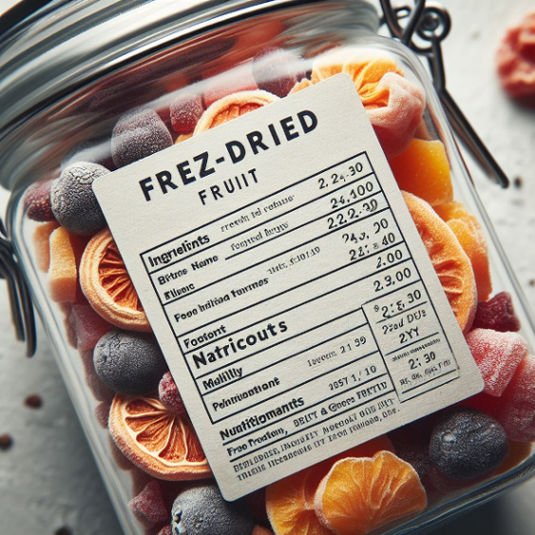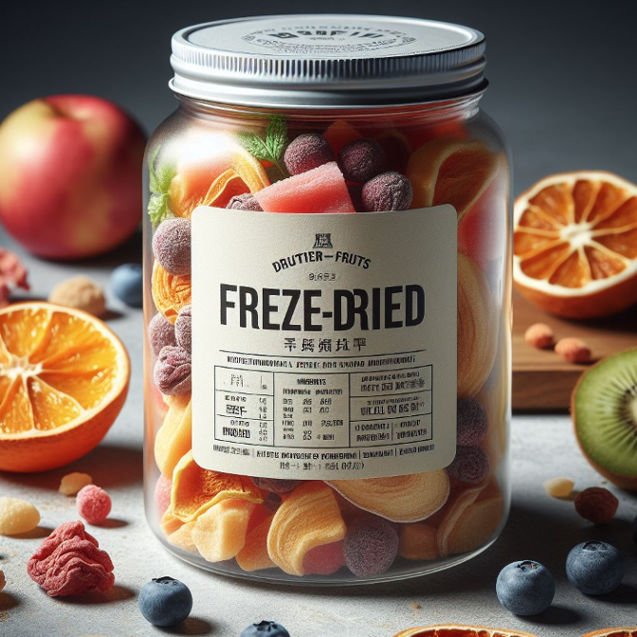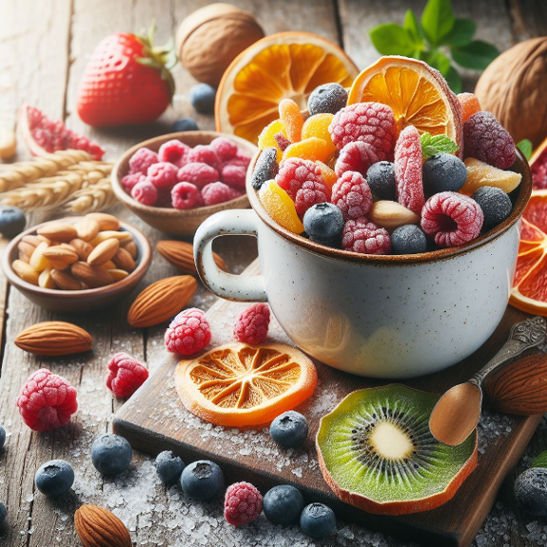
Freeze-dried fruit is becoming increasingly popular as a snack. It’s light and crunchy, with a strong berry flavor. But you might be wondering, “Is the fruit that has been freeze-dried as healthy as fresh fruit?”
According to Lindsay Yau, a registered dietitian nutritionist at Sharp Rees-Stealy Medical Centers, freeze-drying fruit causes some vitamin loss. Still, the overall result is a high-quality, nutrient-dense treat nearly identical to fresh fruit. Research has shown that freeze-dried fruit retains up to 90% of its original nutritional content and is high in vitamins, minerals, fiber, and phytochemicals, which are plant-derived substances.
What is Freeze-Dried Fruit?
Freeze-dried fruit goes through a freeze-drying process that includes sublimation, which evaporates frozen water. Sublimation occurs when fruit freezes in a vacuum chamber and gradually rises in temperature. As a result, the water content never becomes liquid since the solid ice is forced to evaporate as water vapor.
Freeze-drying may eliminate up to 99% moisture, making it an effective food preservation method. Many fruits are suitable for freeze-drying, such as:
| Blackberries |
| Raspberries |
| cherries |
| Strawberries |
| Bananas |
| Peaches |
| Pears |
| pineapples |
Advantages of Fruit Freeze-Dried
Lyophilization, or freeze-drying, is a type of dehydration. The technology was first used to make instant coffee and what we now call “space food.”
Sublimation removes water from freeze-dried fruit, allowing for optimal vitamin retention and other benefits.
- Ingredients
The best way to preserve food while preserving the structure, flavor, and nutritional content of fruit is to freeze-dry it. Certain vitamins, such as thiamine and vitamin C, can be better retained via this approach. Furthermore, freeze-dried fruit is rarely made with additional sugar, although other types of dried fruit frequently contain sugar.
- Extended durability
Freeze-drying extends fruit’s shelf life beyond 25 years. Freeze-dried fruit is a fantastic food alternative for emergencies and camping since it doesn’t need to be refrigerated. Because freeze-dried fruit is smaller than fresh fruit, it can save you space. Most importantly, practically all of the fruit’s nutrients can be retained even after it has been rehydrated and returned to its original structure.
- Convenience
Freeze-dried Fruit is portable, lightweight, and has a long shelf life. Almost every freeze-dried fruit is edible and can serve as a nutritious snack.
Freeze-Dried Fruits vs. Fresh Fruits
| Comparing the Nutrition of Fresh and Freeze-Dried Fruits |
While both freeze-dried and fresh fruits are high in nutrients, there are some distinctions between them. For one thing, the nutritional content of fresh and freeze-dried fruits can differ since fresh fruit tends to continue ripening, which means that the nutritious value of the fruit can reduce with time.
However, freeze-dried fruits are selected and flash-frozen at the pinnacle of their ripeness, preserving all nutrients, vitamins, and minerals. Except for water-soluble vitamin C and a few other compounds present in fruit skins, when a fruit is freeze-dried, much of its nutritious content remains within.
| Comparing the Sugar Content of Freeze-Dried and Fresh Fruit |
This is just untrue, despite the impression that freeze-dried fruit has more sugar than fruit that has been picked.
The trick is portion size, as you may consume many servings of freeze-dried fruit without feeling full, unlike a banana or apple. This means that eating a greater piece of freeze-dried fruit will result in more sugar consumption. So, it’s a matter of watching your portions.
| Comparing the taste of freeze-dried and fresh fruits |
Both freeze-dried and fresh fruits can have different flavors.
Most freeze-dried fruits lack the same aroma as fresh fruits, although some, such as bananas, do.
Depending on your preferences, you may prefer the mild flavor of freeze-dried berries to the tartness of fresh. When it comes to taste, simply try different freeze-dried fruits to see what you enjoy best.
Nutrition of Freeze-Dried Fruit

While fresh fruit is still the finest option, freeze-dried fruits are an excellent alternative. suggest that during the procedure, more nutrients and antioxidants might be retained.
This is because fruits are gathered during their peak season and quickly freeze-dried to preserve all nutrients. Other freeze-dried items, such as meats and vegetables, benefit from the same nutritional preservation process.
Here are some freeze-dried fruit nutrition information compared with their fresh counterparts:
| Sugar and calories from 34 grams of freeze-dried strawberries are 120 and 15, respectively. Fresh strawberries (34 grams): 11 calories, 1.7 grams of sugar. Freeze-dried bananas (40 g): 150 calories and 30 g glucose. Fresh bananas (40 grams): 36 calories, 5 grams of sugar. Freeze-dried raspberries (34 g) provide 130 calories and 13 grams of sugar. Fresh raspberries (34 g) have 18 calories and 1.5 grams of sugar. Freeze-dried peaches (34 grams): 130 calories, 24 grams of sugar. Fresh peaches (34 g) provide 14 calories and 3 grams of sugar. One hundred grams of freeze-dried pineapples has 70 calories and 14 grams of sugar. Fresh pineapples (100 g) provide 50 calories and 10 grams of sugar. |
We can see from this data that freeze-drying can effectively preserve foods to be more nutrient-dense, which can be more beneficial, even though the freeze-dried options may appear less healthful due to their increased calorie and sugar content.
Is freeze-dried fruit healthier than regular fruit?
Finally, dehydrated (and freeze-dried) fruit contains the same nutrients as fresh fruit, such as fiber, vitamins, and minerals. This indicates that nutrient-dense fruits with a low impact on blood sugar (such as blueberries and apples) will not lose nutritional value when dried.
What is the disadvantage of freeze-dried fruit?
The primary downside of freeze-dried foods is the high cost of the specialized equipment required for the procedure. Freeze-dried foods take up nearly as much room as fresh foods, whereas dehydrated goods take up less space.
Is freeze-dried fruit high in sugar?
Yes, freeze-drying increases the sugar content of the fruit because the removal of moisture concentrates the sugar in the fruit. Furthermore, freeze-dried choices are easier to consume in bigger quantities, making them susceptible to overeating. When consuming freeze-dried fruit as a snack, watch the amount you eat.
Is freeze-dried as healthy as fresh?
According to studies, freeze-dried foods frequently preserve more than 90% of the original fresh food’s nutrition, which is significantly higher than other drying procedures (air-drying, heat-drying), which typically degrade micronutrients and phytonutrients — as evidenced by the considerable changes in the food’s hues.
Summary
Are fruits that have been freeze-dried healthy? They surely are, given their ability to store nutrients. Eating them in moderation and conjunction with a well-balanced diet makes them a healthy choice. They’re easy to prepare and delicious! Fruit lovers won’t have to worry about their fruit becoming too soft or spoiling.

I’m a seasoned content creator with 6+ years of experience crafting engaging, SEO-optimized content that drives traffic and rankings. I excel in keyword research, link building, and guest posting, ensuring your brand reaches new heights.

